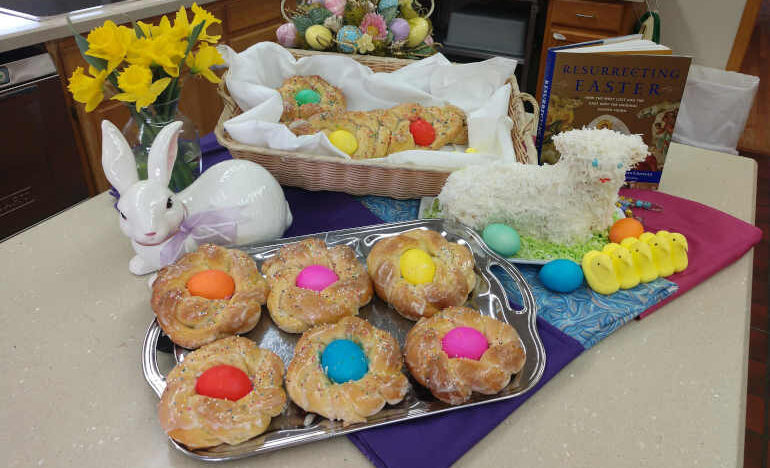How to cope with crazy holiday gatherings

An Assembling God’s Puzzle video
By Fr. Garry Richmeier, CPPS.
Thanksgiving is just around the corner, and for most of us, that means family gatherings. Family members are some of the biggest puzzle pieces that we have to situate in our lives, which is sometimes a challenge. As it is said, we choose our friends but we’re stuck with our families. Or put more positively, God has chosen our family members for us.
In counseling, people often describe their family dynamics in much detail, and afterwards ask “Am I the only person who has a crazy family?” Of course I tell them that my family and every other family is “crazy,” meaning that every family has basically the same difficult issues to deal with, and no family has the perfect answers regarding how to do that.
How to deal effectively with family issues is too big of a topic to discuss in this short video. So maybe it would be helpful limit the discussion to ways we can help our Thanksgiving gatherings go a little bit better. Families generally don’t gather too often, only at things like weddings, funerals, and holidays. So it can be a challenge when they do gather.
One thing to do as you head to the family gathering is to prepare before you get there. Remind yourself that your family members probably haven’t changed too much since you saw them last, so you don’t have to be surprised and shocked that they behave the same way. So you aren’t surprised when Uncle Joe drinks too much and acts inappropriately, or aunt so-and-so snubs you because she is still hurt by something you did, or Grandpa Fred brings up politics or religion to needle people. Also, remember that it isn’t your job or anyone else’s to fix any of the problems.
Also be prepared when something simple triggers a big negative response among the family. People bring the whole past with them when they come to such a gathering, and anything can remind them of things that happened in the past. For example, someone forgets to bring a dish for the Thanksgiving dinner. That may trigger huge resentment for someone else, and they bring up all the past ways that family member has been irresponsible and how that has been hurtful.
Another part of preparation is to have an action plan if and when things get divisive. Be ready to change the subject of conversation, for example. Or think of ways to distract people from the hurtful conversation, like watching sports or playing cards or some other activity. Or plan how you will remove yourself from the situation if all else fails.
There are some helpful things to do to help things go better when you are at the gathering. You can bring up topics of conversation that focus on common experiences and common ground. For example, people often enjoy reminiscing about good times the family shared in the past. Or looking at old photos. You can suggest some fun things everyone can participate in, like playing cards or some other game, taking a family walk around the neighborhood, or driving around to see the Christmas lights that are already up.
To the best of your ability, you can avoid arguing with people at Thanksgiving. It takes at least two to argue, so if you don’t engage with another in this way, it becomes simply a monologue on the part of that person. There are times when people need to hash out disagreements, but it may be better to use Thanksgiving as a time to simply be together rather than trying to make people believe one thing or another.
Also, it is best to avoid excess alcohol, even though alcohol is a traditional staple for many families during the holidays. It dulls a person’s judgment, and it can allow raw emotions to spill out without any filter. It can be the match that lights the forest fire of family conflict.
It is good to remember that there is nothing that you or anyone in your family can do to make the family gathering go perfectly smooth. But maybe some of these strategies can help make it go a little smoother.
The number one thing to do with your family is muster all the compassion and understanding possible. We may come from the same family, but we’ve had many different experiences growing up in that family. We had different kinds of relationships with our parents, we’ve had different challenges and struggles that we haven’t shared, and we may have experienced different traumas that no one knows about. It is unrealistic to think we know everything about each member of our family. All of us are simply doing the best we can with what we’ve got. So we need to simply be kind to each other.
I hope some of this has been helpful as you plan to gather with your family for whatever occasion. I wish all of you a good Thanksgiving.
Photo 254747244 / Family © Aaron Amat | Dreamstime.com Illustration 186385711 © StockSupply | Dreamstime.com
All of the videos in this series can be found here: Assembly God’s Puzzle.
Never miss an article published on the Renewal Center website: Sign up to receive our newsletters.
[Fr. Garry Richmeier, a Precious Blood priest and spiritual director, holds a Master’s of Divinity Degree from St John’s University in Collegeville, Minnesota, and a Master’s of Counseling Psychology degree from the University of Missouri-Kansas City. He is a licensed professional counselor and a licensed marriage and family therapist.]
We’d Like to Hear from You!
We’d like to know what you think about this article. Send us a comment using the form below. Do you have a suggestion? Is there something you want to learn more about? Send us a note.
Related

Easter Bread (Pane di Pasqua)
By Lucia Ferrara
Easter bread is a fun bread. It’s a fun bread to make with your children, with your family, with neighbors and friends. The tradition of Easter bread dates back centuries and comes from many parts of the world.

Easter Sunday, the Resurrection of the Lord
Today’s scriptures tell us how three days changed the world. How have they changed you?
Categories
Assembling God's Puzzle Coffee with Padre Cooking & Spirituality Encounters of the 4th Kind Family Matters Reflections on the Eucharsitic Prayers Spiritual Resources Taize Prayers The Contemplative Life Traveling with Pilgrims of Hope Uncategorized Videos Week of Prayer for Uhristian Unity When you need a little help
